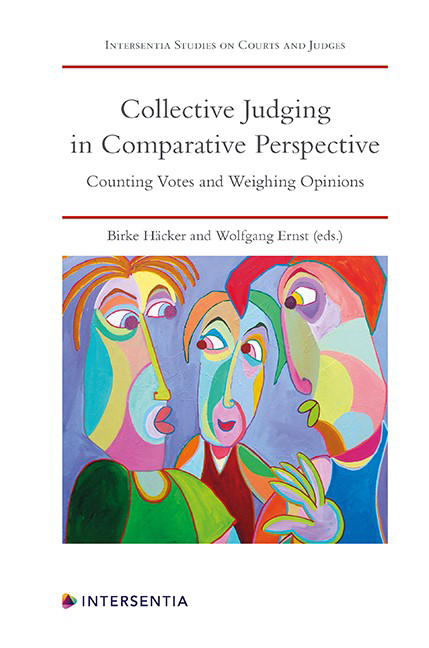Book contents
- Frontmatter
- Preface
- Contents
- List of Cases
- List of Contributors
- PART I DESIGNING COLLEGIATE COURTS’DECISION-MAKING PROCESSES
- PART II COLLEGIATE COURTS IN THE COMMON LAW TRADITION
- PART III COLLEGIATE COURTS IN THE EUROPEAN CIVIL LAW TRADITION
- PART IV COLLEGIATE COURTS IN A NON-EUROPEAN CIVIL LAW JURISDICTION: THE CASE OF JAPAN
- PART V SUPRANATIONAL AND INTERNATIONAL COLLEGIATE COURTS
- PART VI VOICES FROM THE AUDIENCE AND CLOSING REMARKS
- About the Editors
Chapter 7 - Collective Judging in Germany
Published online by Cambridge University Press: 09 February 2021
- Frontmatter
- Preface
- Contents
- List of Cases
- List of Contributors
- PART I DESIGNING COLLEGIATE COURTS’DECISION-MAKING PROCESSES
- PART II COLLEGIATE COURTS IN THE COMMON LAW TRADITION
- PART III COLLEGIATE COURTS IN THE EUROPEAN CIVIL LAW TRADITION
- PART IV COLLEGIATE COURTS IN A NON-EUROPEAN CIVIL LAW JURISDICTION: THE CASE OF JAPAN
- PART V SUPRANATIONAL AND INTERNATIONAL COLLEGIATE COURTS
- PART VI VOICES FROM THE AUDIENCE AND CLOSING REMARKS
- About the Editors
Summary
INTRODUCTION
German law is created by the Bundestag and the Bundesrat, the German legislative bodies. Its essential components are characterised by the great codifications of the 19th century – the Civil Code, the Land Register Code, the Code of Civil Procedure, the Act on Forced Sale and Forced Administration, the Penal Code, the Code of Criminal Procedure, and the Courts Constitution Act – as well as the great 20th century works of legislation in the area of public law – the Federal Building Code, the Act on Administrative Procedure, the Social Code, and the Code of Administrative Court Procedure.These codifications and laws determine the structural principles of German civil, criminal and public law, and in particular the essential rights and obligations of citizens, undertakings and public bodies. Their provisions are sometimes very detailed. A classic example of this is Article 961 BGB, which allows a beekeeper to enter the land of a third party on which his bee swarm has settled, in order to recapture the bees and return them to their hive. But the vast majority of provisions confine themselves to setting out general principles which must then be fleshed out by the courts. However, in a world that is becoming more complex, the number of such principles is increasing steadily.
Many legal cases can of course be resolved by a reading of the text of the relevant legislative provisions. In the vast majority of cases, however, the courts must (so to speak) ‘translate’– judgment after judgment – the abstract rule of law into concrete real-life rules in order to make the general rule more comprehensible. German courts have thus spun a dense web of case law around numerous provisions. This is why we distinguish the written law from the law as experienced, which consists of the provision of law as well as the case law associated with it. To learn about the legal reality in Germany, it is therefore not sufficient simply to read the relevant legislative provisions. It is also necessary to study the attendant commentaries, which consist of the case law concerning those provisions. It will sometimes be surprising to find provisions that have not been fine-tuned or ‘finished‘ in this sense by case law and have remained virtually virgin legal territory for decades.
- Type
- Chapter
- Information
- Collective Judging in Comparative PerspectiveCounting Votes and Weighing Opinions, pp. 141 - 156Publisher: IntersentiaPrint publication year: 2020



